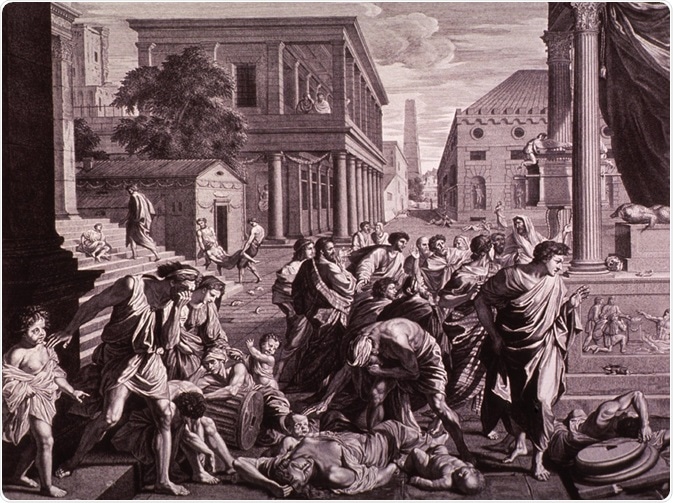The coronavirus disease 2019 (COVID-19) pandemic is often described as an ‘unprecedented’ event, as the outbreak of the severe acute respiratory syndrome coronavirus 2 (SARS-CoV-2) took many by surprise. However, from a scientific and historical standpoint, the novel coronavirus pandemic was entirely predictable.
In fact, scientists and experts had previously written about a possible pandemic, warning that the world was not prepared. A 2017 article published in Time by Bryan Walsh, entitled “The World Is Not Ready for the Next Pandemic,” is an example of how data was already warning of the world’s vulnerability to hyper infectious diseases.

Image Credit: ImageFlow / Shutterstock.com
Introduction
Throughout history, communicable diseases have impacted humanity; however, these diseases became more threatening as society made the shift to agrarian life around 10,000 years ago. The creation of more closely connected communities gave infectious diseases the chance to grow into epidemics. Diseases like influenza, smallpox, leprosy, malaria, and tuberculosis were among those that have thrived since this shift.
As human civilization has evolved and communities have become better connected, the likelihood of pandemics has subsequently risen. Below, we discuss the history of infectious diseases and how they will continue to affect our modern-day lives.
A review of ancient outbreaks
The first recorded pandemic occurred during the Peloponnesian War in Athens, Greece in 430 B.C. The disease was carried across the Athenian walls during the siege. Historians estimate around two-thirds of the population died from contracting the disease.
Following this, the Antonine Plague emerged in 163 A.D. and is now considered to be an early version of smallpox. This plague began with the Huns infecting the Germans, who then passed it to the Romans. Once the Romans acquired the Antonine Plague, it had the opportunity to spread throughout the Roman empire.

Image Credit: Everett Collection / Shutterstock.com
Historians believe that the Cyprian plague began in Ethiopia in 250 A.D. and made its way through Northern Africa to Rome, where it continued to spread northward. The next three centuries was witness to multiple, recurring outbreaks of the Cyprian plague. In fact, this plague changed the course of history, with a particular outbreak leading the British to seek help against the Picts and Scots from the Saxons, who went on to take control of the British Isles.
As civilizations grew and empires conquered different parts of the world, infectious diseases gained more opportunities to spread. In 541 A.D., the Justinian plague broke out in Egypt and spread across Palestine and the Byzantine Empire, finally reaching the Mediterranean. The impact of this plague was significant, as it changed Emperor Justinian’s plans to consolidate the power of the Roman empire. Overall, about 26% of the world’s population fell to the Justinian plague, which is now considered to be the first significant emergence of the bubonic plague.
Recent history of infectious diseases
In more recent history, leprosy ravaged Europe throughout the 11th century, which was then followed by the infamous Black Death of the 14th century. This second and largest outbreak of the bubonic plague claimed the lives of 30-60% of the European population. In 1665, the bubonic plague made another appearance, causing the deaths of 20% of London’s population during what is now known as The Great Plague of London.
Since the first major outbreak in 1817, there have been seven cholera pandemics to date. Although a cholera vaccine was created in the late 1800s, outbreaks have continued to be problematic. The 1800s also saw the third outbreak of the bubonic plague, which claimed the lives of more than 15 million people. The Fiji Measles Pandemic also occurred in 1875, where 40,000 people, which was one-third of Fiji’s total population, died.
As the world moved into the 20th century, influenza pandemics became more frequent. Between 1889 and 1890, 360,000 died from the Russian Flu. Unfortunately, this figure was minimal in comparison to the 50 million deaths that resulted from the Spanish Flu pandemic that began in 1918.
The 1918 pandemic was shortly followed by the Asian Flu pandemic that saw two waves in the 1950s. The final pandemic of the 20th century was the human immunodeficiency virus (HIV)/acquired immunodeficiency syndrome (AIDS) pandemic, which was first identified in 1981. The spread of HIV/AIDS is still considered to be a pandemic, as more than 32 million lives have been lost to this disease over the past four decades.
The deadly threat of coronaviruses
The most recent pandemics have been the 2003 severe acute respiratory syndrome (SARS) pandemic and the current COVID-19 pandemic, both of which have been caused by coronaviruses.
The SARS pandemic claimed the lives of 774 people before it was effectively controlled via quarantine efforts. The SARS pandemic was viewed as a wake-up call by global health agencies, who believed it highlighted the world’s unreadiness to deal with and prevent the spread of infectious diseases from developing into a pandemic.
Lessons learned in the SARS pandemic were used to control the H1N1, Ebola, and Zika outbreaks. Despite this, the world remains unprepared for COVID-19, as it was ultimately declared a global pandemic by the World Health Organization on March 11, 2020.
Lessons learned from COVID-19
As of July 22, 2021, more than 4.13 million deaths have been attributed to COVID-19, with over 192 million confirmed cases. Other than the loss of life and number of cases, COVID-19 significantly changed the world, as it paused economies and prevented social interaction, both of which inevitably impacted mental health, food security, and much more for the global population.
The COVID-19 pandemic also taught the world about how to deal with and prepare for future pandemics, as many scientists warn of their inevitability in the future. It is likely that the measures that have been implemented to curb the spread of COVID-19 will remain in place to continue to protect us from the spread of infectious diseases in the future.
For the infections that may break through these barriers, the world now has the experience to create effective vaccines in record-breaking time. While the emergence of infectious diseases cannot be completely prevented, various measures can be taken to minimize their impact on human life.
Lessons Learned During The Coronavirus Pandemic: A Harry Smith Essay | Sunday TODAY
References
- Covid map: Coronavirus cases, deaths, vaccinations by country. BBC News. Available at: https://www.bbc.co.uk/news/world-51235105
- Piret, J. and Boivin, G., 2021. Pandemics Throughout History. Frontiers in Microbiology, 11. https://www.frontiersin.org/articles/10.3389/fmicb.2020.631736/full
- Shaw‐Taylor, L., 2020. An introduction to the history of infectious diseases, epidemics and the early phases of the long‐run decline in mortality†. The Economic History Review, 73(3). https://www.ncbi.nlm.nih.gov/pmc/articles/PMC7404362/
- The World Is Not Ready for the Next Pandemic. Bryan Walsh. Time. Available at: https://time.com/magazine/us/4766607/may-15th-2017-vol-189-no-18-u-s/
Further Reading
Last Updated: Jul 22, 2021